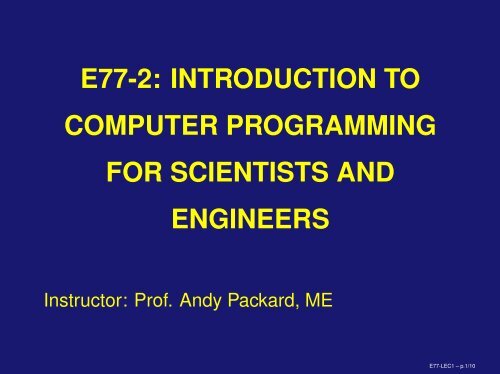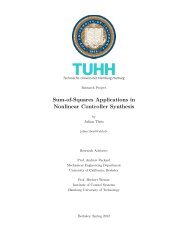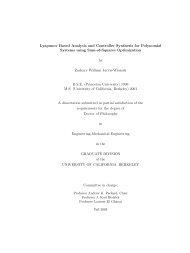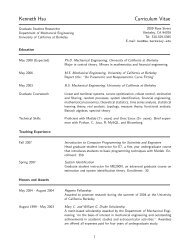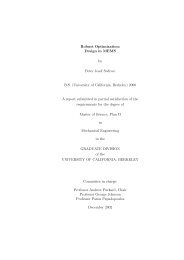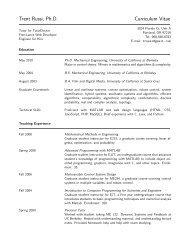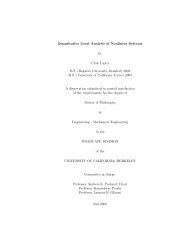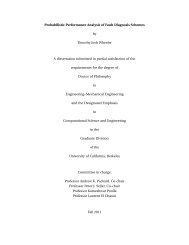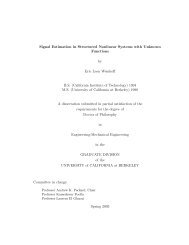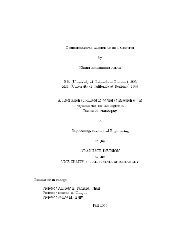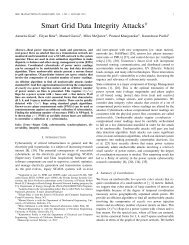e77-2: introduction to computer programming for scientists
e77-2: introduction to computer programming for scientists
e77-2: introduction to computer programming for scientists
You also want an ePaper? Increase the reach of your titles
YUMPU automatically turns print PDFs into web optimized ePapers that Google loves.
E77-2: INTRODUCTION TO<br />
COMPUTER PROGRAMMING<br />
FOR SCIENTISTS AND<br />
ENGINEERS<br />
Instruc<strong>to</strong>r: Prof. Andy Packard, ME<br />
E77-LEC1 – p.1/10
7 hours/week in-class time<br />
• 2 lectures per week, Monday and Wednesday,<br />
1:10-2:00<br />
• 2, 2-hour labs sessions/week (you should have signed<br />
up <strong>for</strong> a section, they meet in 1109 Etcheverry Hall)<br />
• 1 discussion section per/week<br />
Labs begin next Tuesday (September 7th). Don’t worry if<br />
your lab starts on Monday.<br />
E77-LEC1 – p.2/10
Course texts<br />
Text: Mastering Matlab 6, by Hanselmann and<br />
Littlefield.<br />
There are hundreds, if not thousands of books on<br />
Matlab. Most are terrible. This one is pretty good.<br />
Definitely worth buying...<br />
E77-LEC1 – p.3/10
Course Software<br />
Matlab, produced by The Mathworks. See<br />
www.mathworks.com.<br />
Matlab is a 20+ year old language that has<br />
evolved in<strong>to</strong> a <strong>programming</strong> environment <strong>for</strong><br />
scientific software development.<br />
It can be used on its own, as well as seemlessly<br />
interfaced with languages such as Java, C and<br />
Fortran.<br />
• Powerful - can be used <strong>to</strong> solve numerous<br />
scientific and engineering problems.<br />
• Friendly <strong>for</strong> the beginning programmer.<br />
• Multimedia-capable (graphics, movies,<br />
E77-LEC1 – p.4/10
Availability<br />
The <strong>computer</strong>s in 1109 Etcheverry Hall (the E77<br />
lab) have Matlab.<br />
You can also purchase the Student Edition of Matlab<br />
from the books<strong>to</strong>re <strong>for</strong> about $100. It runs on PC,<br />
Mac, and Linux. Includes Simulink, Symbolic<br />
Math, and two books. Professional price is about<br />
$5,000. Some minor limitations, but you would<br />
be hard pressed <strong>to</strong> notice them.<br />
License allows you <strong>to</strong> use the software while you<br />
are a student.<br />
E77-LEC1 – p.5/10
Grading<br />
Grade computation is based on:<br />
25% Labora<strong>to</strong>ry assignments (<strong>to</strong>tal of 11)<br />
20% Homework assignments (<strong>to</strong>tal of 6)<br />
15% Midterm examination 1<br />
15% Midterm examination 2<br />
25% Final examination<br />
E77-LEC1 – p.6/10
Website<br />
Course Website is at blackboard.berkeley.edu. You<br />
can get signed up <strong>for</strong> the blackboard account during the<br />
first lab session, which is next week (week of Sept 6-10).<br />
At the website, you can access<br />
• Handouts<br />
• Reader<br />
• Lecture Material<br />
• Announcements and In<strong>for</strong>mation<br />
• Homework Assignments<br />
• Lab Assignments<br />
• Solutions <strong>to</strong> Homework and Lab<br />
• Web discussion group<br />
E77-LEC1 – p.7/10
About myself<br />
I have been a professor in the UC system <strong>for</strong> 16 years.<br />
I first used a real <strong>computer</strong> in 1979, using punch cards.<br />
I am most com<strong>for</strong>table <strong>programming</strong> in two languages:<br />
Matlab and C. I have used both languages <strong>for</strong> nearly 20<br />
years.<br />
My speciality is au<strong>to</strong>matic control systems. There, we use<br />
<strong>computer</strong>s <strong>to</strong> reactively control devices, processes, etc.<br />
Simple example is cruise-control system in a car. The<br />
mantra in au<strong>to</strong>matic control systems is<br />
Measure, Compute, Act<br />
E77-LEC1 – p.8/10
About you<br />
A few things I wanted <strong>to</strong> know about you:<br />
E77-LEC1 – p.9/10
About you<br />
A few things I wanted <strong>to</strong> know about you:<br />
Have you ever used a <strong>computer</strong><br />
E77-LEC1 – p.9/10
About you<br />
A few things I wanted <strong>to</strong> know about you:<br />
Have you ever used a <strong>computer</strong><br />
Have you ever used a <strong>computer</strong> in a science project<br />
E77-LEC1 – p.9/10
About you<br />
A few things I wanted <strong>to</strong> know about you:<br />
Have you ever used a <strong>computer</strong><br />
Have you ever used a <strong>computer</strong> in a science project<br />
Have you ever written a <strong>computer</strong> program<br />
E77-LEC1 – p.9/10
About you<br />
A few things I wanted <strong>to</strong> know about you:<br />
Have you ever used a <strong>computer</strong><br />
Have you ever used a <strong>computer</strong> in a science project<br />
Have you ever written a <strong>computer</strong> program<br />
Do you own a <strong>computer</strong><br />
E77-LEC1 – p.9/10
About you<br />
A few things I wanted <strong>to</strong> know about you:<br />
Have you ever used a <strong>computer</strong><br />
Have you ever used a <strong>computer</strong> in a science project<br />
Have you ever written a <strong>computer</strong> program<br />
Do you own a <strong>computer</strong><br />
Do you own a lap<strong>to</strong>p <strong>computer</strong><br />
E77-LEC1 – p.9/10
About the course content<br />
E77 has three main objectives:<br />
• Develop familiarity with <strong>computer</strong>s and <strong>computer</strong><br />
software in a scientific and engineering setting.<br />
• Provide a working knowledge of <strong>computer</strong><br />
<strong>programming</strong>.<br />
• Introduce scientific and engineering problem-solving<br />
methods that make use of <strong>computer</strong>s.<br />
E77-LEC1 – p.10/10


